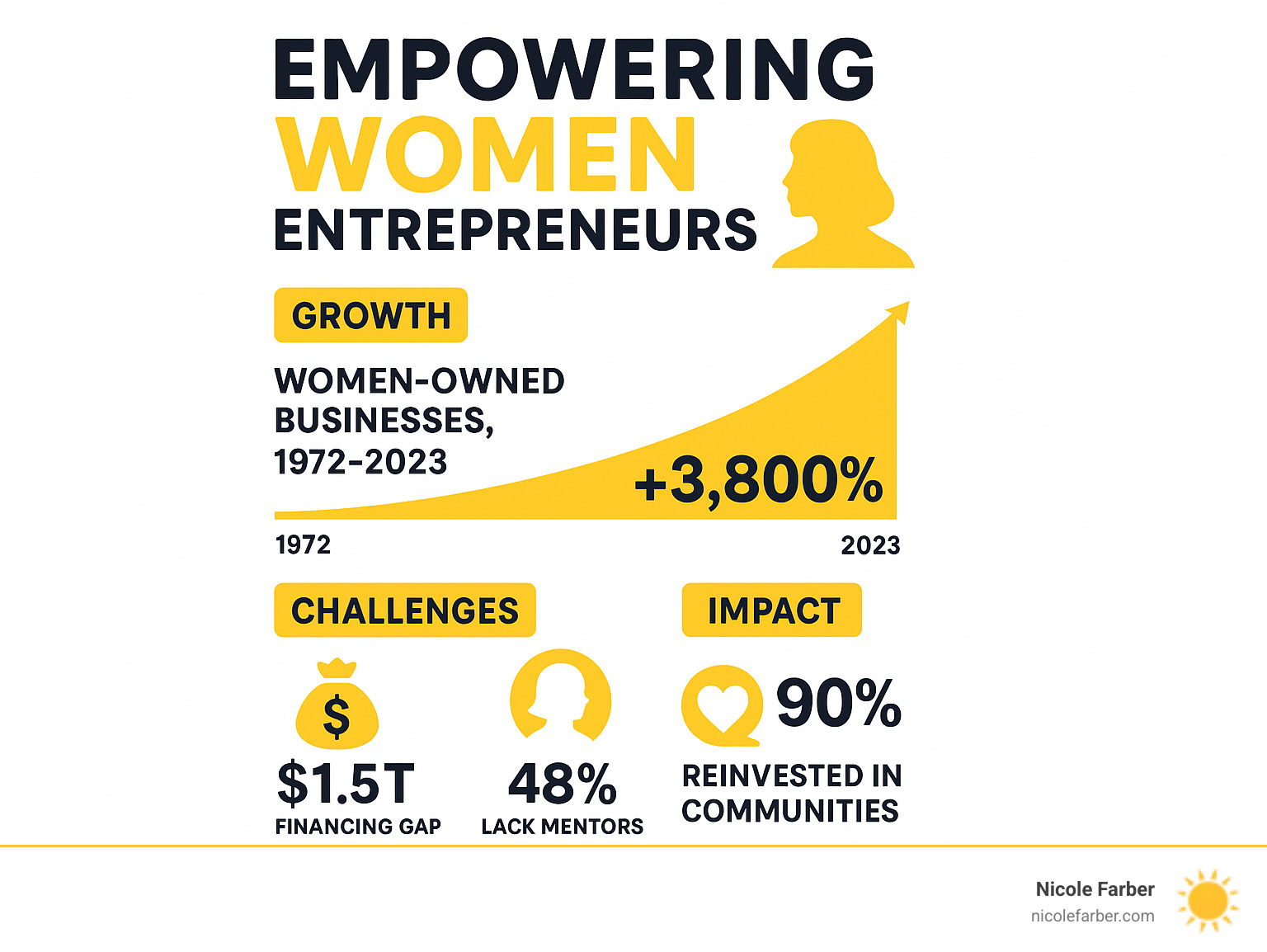She Means Business: How to Empower Women Entrepreneurs Globally
- Entrepreneurship
- In the News
- August 13, 2025
Why Empowering Women Entrepreneurs Matters for Global Economic Growth

Empowering women entrepreneurs is critical for global economic development, innovation, and social progress. Despite women-led businesses accounting for 28% of businesses globally, they face significant challenges including a $1.5 trillion financing deficit, discriminatory laws in 94% of economies, and cultural barriers that limit their growth potential.
Key Empowerment Strategies:
- Financial inclusion through microloans, venture capital, and digital financial services
- Mentorship programs addressing the 48% of women entrepreneurs who lack role models
- Skill development in business education, financial literacy, and digital marketing
- Policy advocacy for inclusive laws and equal property ownership rights
- Technology access to bridge digital divides and reach global markets
- Network building through professional associations and peer support groups
The impact is transformative. In the U.S., women-owned businesses grew by 3,382% from 1972 to 2023, creating over 10 million jobs and generating $3.9 trillion in revenue. Women entrepreneurs reinvest up to 90% of their income back into families and communities, compared to just 30-40% by men, creating ripple effects that strengthen entire regions from Philadelphia to Wilkes-Barre to global communities.
Yet challenges persist. Women face gender-based discrimination, work-life balance pressures, and exclusion from supply chains that cap their revenue potential. In regions like Luzerne County and cities like New Orleans, local support networks become crucial for overcoming these barriers and building thriving entrepreneurial ecosystems.
As Nicole Farber, CEO of ENX2 Legal Marketing with over 15 years of experience supporting business growth, I’ve witnessed how empowering women entrepreneurs transforms not just individual businesses but entire communities. My work with law firms and businesses nationwide has shown me that when women receive the right support, mentorship, and resources, they create sustainable enterprises that drive lasting economic and social change.

The Global Landscape: Challenges and Triumphs for Women in Business

Picture this: it’s 10 PM, and a woman entrepreneur in Luzerne County is still at her desk, pouring over business plans and financial projections. She represents millions of women worldwide who are building businesses against significant odds. While women-led businesses make up 28% of all enterprises globally, they face a landscape that’s both promising and challenging.
The reality is stark. Women entrepreneurs deal with a $1.5 trillion global financing deficit, legal barriers in 94% of economies, and cultural biases that can feel overwhelming. Yet their resilience continues to drive innovation and economic growth in communities from Philadelphia to Antigua Guatemala.
Understanding these challenges isn’t meant to discourage—it’s the foundation for empowering women entrepreneurs effectively. When we know what we’re up against, we can build better solutions. For deeper insights into current trends, check out The state of women entrepreneurs report.
Overcoming Financial Problems
Let’s talk about the elephant in the room: access to capital. This is where many promising businesses hit their first major roadblock. Women-owned businesses receive only a tiny fraction of venture capital compared to men’s businesses, contributing to that massive $1.5 trillion financing gap.
The problem isn’t just about big venture capital deals. It starts with basic financial services. In Africa, only 15% of women have formal financial accounts compared to 23% of men. This pattern repeats in communities everywhere—from rural areas in Antigua Guatemala to small towns in Pennsylvania.
Microloans and financial inclusion programs are starting to bridge this gap. Women need custom financial products designed for their unique situations, including credit guarantee programs that reduce lender risk. Digital financial services are also opening new doors, allowing women to access funding without traditional banking barriers.
The key is recognizing that financial empowerment goes hand-in-hand with business success. For strategies on building financial leadership skills, explore More info about business leadership strategies.
Navigating Social and Systemic Barriers
Beyond money, women entrepreneurs face a web of social and systemic challenges that can feel suffocating. Cultural stereotypes affect 31% of young women entrepreneurs, often before they even start their first business. These biases whisper that women aren’t “natural” business leaders or that they should prioritize family over ambition.
Here’s a sobering statistic: 48% of women entrepreneurs lack mentorship or role models. Imagine trying to steer uncharted territory without a guide—that’s what nearly half of all women business owners face daily.
The work-life balance struggle is real too. About 23% of women entrepreneurs report heightened stress from juggling business demands with family responsibilities. This isn’t about women being less capable—it’s about societal expectations that place the bulk of caregiving responsibilities on women’s shoulders.
Then there are the discriminatory laws. In 94% of economies, some form of legal barrier exists—from property ownership restrictions to requirements for male consent in business dealings. These aren’t just statistics; they represent real women whose dreams are constrained by outdated legal systems.
Imposter syndrome often creeps in when facing these barriers. But recognizing your worth and potential is crucial for success. As I discuss in Choose to Accept Your Gift and Let It Shine, embracing your unique strengths is essential for entrepreneurial success.
A Story of Growth and Resilience
Despite these formidable challenges, women entrepreneurs are writing an incredible success story. The numbers tell a tale of remarkable determination and growth that should inspire us all.
In the United States, women-owned businesses exploded from 402,000 in 1972 to 14 million in 2023—a mind-blowing 3,382% increase. But it’s not just about quantity. Revenue from these businesses grew by 48,048% and employment by 4,291% during the same period.
Women of color are driving much of this growth, often starting businesses out of necessity but building them into powerful economic engines. These entrepreneurs are creating job opportunities in communities that need them most, from the vibrant streets of New Orleans to the close-knit neighborhoods of Wilkes-Barre.
What makes this growth even more impressive is that it’s happening despite the barriers we’ve discussed. Women entrepreneurs are finding creative ways around obstacles, building supportive networks, and proving that determination can overcome systemic challenges.
Their economic contribution extends far beyond their own businesses. They’re fostering innovation, diversifying markets, and creating more resilient local economies. Each success story represents not just one woman’s triumph, but a ripple effect that strengthens entire communities.
This journey of perseverance perfectly embodies the principle that Chaos Brings Opportunity. When faced with challenges, successful women entrepreneurs don’t just survive—they thrive and create opportunities for others to follow.
Core Strategies for Empowering Women Entrepreneurs

When I think about empowering women entrepreneurs, I see it as building bridges—bridges over financial gaps, knowledge divides, and systemic barriers. The challenges are real, but so are the solutions. We need a thoughtful approach that tackles the root causes while celebrating the incredible strength women bring to business.
The path forward isn’t just about one magic fix. It’s about weaving together financial inclusion, meaningful skill development, smart policy changes, and embracing technology in ways that actually work for real women building real businesses.
Financial Inclusion and Access to Capital
Let’s be honest—money talks, and women entrepreneurs often struggle to join that conversation. The $1.5 trillion financing deficit isn’t just a number; it represents dreams deferred and innovations stalled.
The good news? We’re seeing creative solutions emerge. Custom financial products designed specifically for women-owned businesses are making a real difference. Think microloans that understand the unique cash flow patterns of service-based businesses, or venture capital funds that actually get what women entrepreneurs bring to the table.
Credit guarantee programs are another game-changer. When lenders know there’s backup support, they’re more willing to take what they perceive as risks—even though women actually have better repayment rates than men.
Digital financial services are opening doors in places where traditional banks never bothered to build branches. Whether you’re in downtown Philadelphia or a small community in Antigua Guatemala, your smartphone can become your financial gateway. This digital infrastructure—complete with secure payment platforms and identity systems—is leveling the playing field in ways we couldn’t imagine just a decade ago.
For deeper insights into financial leadership strategies, check out the National Women’s Business Council annual reports, which offer valuable data on funding trends and opportunities.
The Power of Mentorship and Skill Development
Here’s something that breaks my heart: nearly half of women entrepreneurs—48%—don’t have a mentor or role model. As someone who’s walked this path as a single mother building a business, I know how isolating entrepreneurship can feel.
Business education programs are crucial, but they need to go beyond generic advice. Women need training in financial literacy that speaks to their specific challenges, leadership skills that help them command respect in male-dominated industries, and negotiation tactics that work with their natural communication styles.
The magic happens when experienced women share their real stories—the failures, the pivots, the moments of doubt, and the breakthroughs. Through my work both locally in Philadelphia and in global initiatives, I’ve seen how transformative it is when women realize they’re not alone in their struggles.
If you’re ready to take your entrepreneurial journey to the next level, consider exploring expert women entrepreneur coaching. Sometimes having someone in your corner who truly understands the journey makes all the difference.
Leveraging Technology and Digital Change
Technology isn’t just nice to have anymore—it’s the great equalizer. A woman running a boutique in Wilkes-Barre can now sell to customers worldwide. An entrepreneur in New Orleans can access the same digital marketing tools as Fortune 500 companies.
Digital marketing skills are essential in today’s economy. E-commerce platforms break down geographical barriers and eliminate the need for expensive physical storefronts. AI and automation can handle routine tasks, freeing up entrepreneurs to focus on strategy and growth.
But here’s the thing—we need to bridge the digital divide that still exists. Not everyone has reliable internet or the latest devices. Programs that provide both access and training are essential, whether we’re talking about urban centers like Philadelphia or remote communities in places like Antigua Guatemala.
When women master these digital tools, they don’t just compete—they innovate in ways that often surprise established players in their industries.
Advocating for Policy Change
Real change requires more than individual effort—it demands systemic change. We need inclusive policies that recognize the reality of women’s lives, not policies designed around a 1950s model of work.
Parental leave isn’t just nice to have; it’s essential for women who want to build businesses without sacrificing their families. Property ownership rights matter because you can’t use what you don’t legally own as collateral for business loans.
The goal isn’t special treatment—it’s creating a level playing field where success depends on the quality of your ideas and the strength of your execution, not your gender or family status.
Representation in government and business associations ensures women’s voices are heard when these crucial decisions are made. When women are at the table, policies tend to be more practical and inclusive for everyone.
The Ripple Effect: Economic and Social Impact of Women-Led Businesses

When we talk about empowering women entrepreneurs, we’re not just discussing individual success stories. We’re looking at something much bigger—a powerful ripple effect that transforms entire communities and drives meaningful change across the economic landscape.
Think of it this way: when a woman starts and grows her business, it’s like dropping a stone into still water. The circles keep expanding outward, touching lives and creating opportunities in ways we might not even realize at first.
Driving Economic Development
Women-led businesses are economic powerhouses, plain and simple. They don’t just contribute to GDP numbers on a spreadsheet—they breathe life into local economies and spark innovation in ways that surprise even seasoned economists.
What makes women entrepreneurs particularly valuable is their ability to diversify markets and identify gaps that others miss. They often create products and services that serve underrepresented communities or address needs that traditional businesses overlook. This fresh perspective leads to breakthrough innovations and new market opportunities.
In communities like Wilkes-Barre and Luzerne County, I’ve seen how women entrepreneurs become catalysts for resilient local economies. They create jobs, yes, but they also build networks, support other local businesses, and inject creative energy that revitalizes entire neighborhoods.
The numbers tell a compelling story too. Women-owned businesses in the U.S. now generate $3.9 trillion in revenue and employ over 10 million people. That’s not just economic activity—that’s economic change.
Investing in Families and Communities
Here’s where the ripple effect becomes truly remarkable. Women entrepreneurs have a unique approach to success—they reinvest up to 90% of their income back into their families and communities, compared to just 30-40% by men.
This isn’t just about being generous (though that’s certainly part of it). It’s about understanding that business success means nothing if it doesn’t lift others up too. When women succeed in business, children get better education, families receive improved healthcare, and communities see infrastructure improvements.
I’ve witnessed this pattern repeatedly in my work with entrepreneurs from Philadelphia to New Orleans. Women business owners consistently prioritize community investment over personal wealth accumulation. They understand that their success is interconnected with the wellbeing of those around them.
This creates what economists call a “virtuous cycle.” Money flows back into local economies, creating more opportunities, which in turn support more businesses and families. It’s sustainable growth that builds from the ground up. This deep sense of purpose often stems from faith-based leadership principles that prioritize service and community impact.
Inspiring a More Equitable Future
Perhaps the most profound impact of empowering women entrepreneurs is how it reshapes what’s possible for future generations. Every successful woman business owner becomes a living example that breaks down barriers and challenges stereotypes.
Young girls in communities from Luzerne County to Antigua Guatemala see these role models and think, “If she can do it, maybe I can too.” That shift in mindset is invaluable. It creates a new generation of leaders who approach business with fresh perspectives and inclusive values.
Women entrepreneurs also tend to foster more inclusive workplaces. They’re more likely to hire diverse teams, offer flexible working arrangements, and create environments where different perspectives are valued. This doesn’t just benefit their employees—it makes their businesses more innovative and responsive to diverse customer needs.
The leadership skills that successful women entrepreneurs develop often extend far beyond their businesses. Many become community leaders, mentors, and advocates for change. Understanding how to become an effective leader often starts with seeing these inspiring examples in action.
The social benefits from women-led businesses create lasting change: prioritizing ethical practices and social responsibility, fostering community involvement and local development, promoting diversity within teams and customer relationships, addressing unique societal needs often overlooked by larger corporations, creating supportive work environments that value flexibility and work-life balance, championing sustainability and environmental stewardship, and building collaborative networks that strengthen entire business ecosystems.
This ripple effect is why empowering women entrepreneurs isn’t just good for women—it’s essential for creating stronger, more equitable communities where everyone has the opportunity to thrive.
Building the Future: Creating Supportive Ecosystems and Inspiring the Next Generation

The future of empowering women entrepreneurs isn’t built in isolation—it flourishes when we create vibrant ecosystems where women can connect, grow, and lift each other up. I’ve watched countless women transform their businesses and communities when they find the right support network and visibility. It’s not just about starting a business; it’s about building something that lasts and inspires others to follow.
The Importance of Strong Networks
Entrepreneurship can feel incredibly lonely, especially for women juggling multiple responsibilities. That’s why strong networks become lifelines, not just business tools. When women connect through peer support groups, professional associations, and industry conferences, magic happens. They share resources, offer honest feedback, and provide the encouragement needed during tough times.
Organizations like the Philadelphia Women’s Network Connection understand this deeply. They create spaces where women can be vulnerable about their struggles while celebrating their wins together. These connections often become the foundation for building lasting relationships that extend far beyond business cards and LinkedIn connections.
The beauty of modern networking is how it transcends geography. A woman entrepreneur in Wilkes-Barre can now connect with peers in New Orleans or even Antigua Guatemala through digital platforms. This global reach helps overcome isolation and opens doors to opportunities that might never have existed otherwise.
Amplifying Success and Inspiring Others
Visibility changes everything. When we shine a spotlight on women’s achievements through awards and recognition, media visibility, and sharing success stories, we create ripple effects that reach far beyond the individual being celebrated. Every time a woman’s entrepreneurial journey gets featured, another woman somewhere thinks, “If she can do it, maybe I can too.”
But here’s what I’ve learned in my years as a female leadership speaker—it’s not just the polished success stories that inspire. Women need to hear about the messy middle, the failures, the moments of doubt, and how others pushed through. When we share the real, unfiltered journey of building a business, we give others permission to struggle and keep going.
Through my programs and community impact initiatives, I’ve seen how authentic storytelling transforms mindsets. A single mother in Luzerne County might hear about another woman’s journey and realize her own dreams are possible. This is the true power of amplification—it multiplies hope and possibility.
Shifting Mindsets for Long-Term Success
The most sustainable change happens when we address the deeper cultural and mindset barriers that hold women back. Challenging cultural norms isn’t just about changing policies—it’s about changing hearts and minds, one conversation at a time.
Encouraging family support becomes crucial here. When a woman’s family believes in her entrepreneurial dreams, her chances of success skyrocket. We need more initiatives that help families understand the value of supporting the women in their lives, not just tolerating their ambitions.
Promoting men as allies creates powerful partnerships. I’ve seen incredible change in communities where men actively champion women’s businesses, from Luzerne County to global markets. These allies don’t just offer moral support—they open doors, make introductions, and use their networks to create opportunities.
Building confidence and resilience requires ongoing nurturing. Whether working with women in Philadelphia’s busy business scene or supporting entrepreneurs in smaller communities like Wilkes-Barre, I’ve learned that confidence grows through action and community support. When women see others like them succeeding, when they have mentors cheering them on, and when they’re surrounded by people who believe in their potential, they begin to believe it themselves.
The future we’re building isn’t just about more women-owned businesses—it’s about creating a world where every woman with an entrepreneurial dream has the ecosystem she needs to turn that dream into reality.
Frequently Asked Questions about Empowering Women Entrepreneurs
What is the single biggest barrier for women entrepreneurs today?
After working with countless entrepreneurs across Philadelphia, Wilkes-Barre, and beyond, I can tell you that the most significant barrier is access to capital. It’s heartbreaking to see brilliant women with game-changing ideas struggle to get the funding they need.
The numbers tell the story: women face a massive $1.5 trillion global financing deficit. They receive only a tiny fraction of venture capital funding compared to men. This isn’t just about big investment rounds either—it affects everything from small business loans to microfinancing opportunities.
I’ve seen this in communities from Luzerne County to New Orleans. Women come to me with incredible business plans, but they hit wall after wall when trying to secure funding. This lack of capital doesn’t just limit individual dreams—it holds back innovation, job creation, and entire local economies.
How can I support women-owned businesses in my community?
Supporting women entrepreneurs in your area is easier than you might think, and every action makes a real difference. The most direct way is to buy from them—whether it’s choosing a woman-owned restaurant in Philadelphia or hiring a female consultant in Wilkes-Barre.
But your support can go much further. Share their businesses on your social media, write positive reviews, and tell your friends about great experiences you’ve had. Word-of-mouth marketing is incredibly powerful for small businesses.
Connect them with your network whenever possible. If you know someone looking for exactly what a woman entrepreneur offers, make that introduction. Attend local networking events and business showcases. In my experience, these connections often lead to the breakthrough opportunities that transform businesses.
When you support women-owned businesses, you’re not just helping one person—you’re investing in your community’s economic growth and diversity.
What role does mentorship play in empowering women entrepreneurs?
Mentorship is absolutely transformative for women in business. I’ve witnessed this countless times in my own coaching work and throughout my journey as a CEO and single mother building a business.
Here’s the reality: 48% of women entrepreneurs lack a mentor or role model. That’s nearly half of all women starting businesses without someone to guide them through the challenges, celebrate their wins, and help them avoid costly mistakes.
A good mentor provides practical guidance on everything from financial planning to leadership skills. But equally important, mentorship builds confidence. When you’re facing imposter syndrome or questioning a big decision, having someone who believes in you and has walked a similar path is invaluable.
Mentors also expand your professional network exponentially. They introduce you to potential clients, partners, and other mentors. This ripple effect can open doors that might otherwise remain closed.
Whether you’re in a major hub like Philadelphia or a smaller community like those in Luzerne County, finding or becoming a mentor creates lasting impact. It’s one of the most powerful tools we have for empowering women entrepreneurs and building stronger business communities everywhere.
Conclusion
The path to empowering women entrepreneurs isn’t just about business—it’s about creating a better world for all of us. Throughout this journey, we’ve seen how women face real challenges, from that overwhelming $1.5 trillion financing gap to balancing family life with business dreams. Yet we’ve also witnessed something beautiful: their incredible resilience and the way they lift entire communities as they rise.
What strikes me most is how women entrepreneurs reinvest up to 90% of their earnings back into their families and communities. That’s not just a statistic—that’s change in action. Whether it’s a mom in Wilkes-Barre growing her home-based business or a tech entrepreneur in Philadelphia scaling her startup, these women are creating ripple effects that touch lives far beyond their immediate circle.
The strategies we’ve explored—financial inclusion, mentorship, technology access, and policy advocacy—aren’t just nice ideas. They’re practical tools that work. When we provide women with the right support, amazing things happen. I’ve seen it in my work across different communities, from Luzerne County to New Orleans, and even in my global initiatives reaching places like Antigua Guatemala.
As someone who’s walked this path as both a CEO and a single mother, I know the unique challenges we face. But I also know our unique strengths. Faith-driven leadership and genuine resilience aren’t just buzzwords—they’re the foundation of lasting success. When we combine our natural ability to nurture and build community with solid business strategies, we become unstoppable.
The future belongs to those brave enough to dream big and persistent enough to make those dreams reality. Every woman who starts a business, every mentor who shares her wisdom, and every community that supports women entrepreneurs is part of this incredible movement.
Ready to be part of this change? Whether you’re looking to inspire your team or share these powerful insights with your organization, let’s connect. Book a motivational leadership keynote speaker and bring these life-changing messages to your audience. Because when she means business, the whole world benefits.